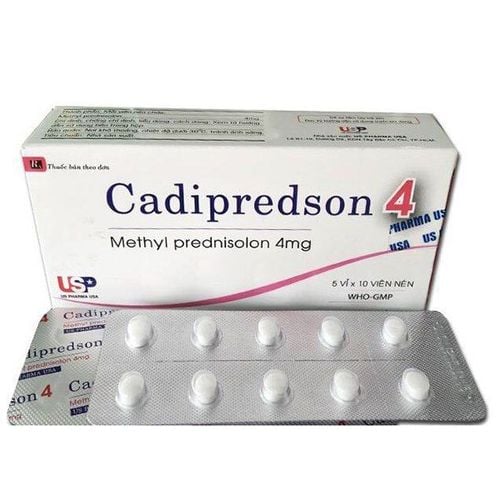This is an automatically translated article.
Thysedow drug belongs to the group of endocrine drugs with the main ingredient being Thiamazol, often used to relieve symptoms of hyperthyroidism or as an adjuvant before and in radioactive iodine treatment, treatment of thyrotoxicosis before using iodized salt. Thysedow usually starts working in 1-3 weeks and goes away 1-2 months after the initial dose.
1. What is Thysedow?
Thysedow drug has the main ingredient is thiamazole, which inhibits the synthesis of thyroid hormones, so it is used to treat hyperthyroidism. However, thiamazole has no effect on externally administered Thyroid hormone and does not inhibit thyroid hormone release. Thysedow is usually indicated in the following cases:
Treatment of symptoms of hyperthyroidism (including Graves-Basedow), especially small or no goiter Treatment before thyroid surgery due to hyperthyroidism until When basal metabolism is normal, to prevent possible thyrotoxicosis with partial thyroidectomy Adjuvant therapy before and during radioiodine therapy until radioiodine therapy is effective remove thyroid gland Treatment of thyrotoxicosis before using iodized salt (usually used concomitantly with beta-blockers, especially when there are cardiovascular symptoms) Thysedow is contraindicated in the following cases:
Hypersensitivity to other thionamides or any component of Thysedow, Patients with moderate-to-severe blood count disturbances Pre-existing cholestasis not due to hyperthyroidism History of bone marrow injury following thiamazole/carbimazole therapy Patients taking thyroid hormone therapy throughout pregnancy Period Patients with severe liver failure
2. Dosage of Thysedow:
Thysedow should be taken with food, swallowed whole with enough water. Depending on the subject and the treatment goal, the dose of Thysedow will be different, specifically as follows:
For adults with hyperthyroidism:
Initial dose: take every 8 hours apart from mild hyperthyroidism: 5 mg/time x 3 times/day Moderate hyperthyroidism: 10 mg/time x 3 times/day Severe hyperthyroidism: 20 mg/time x 3 times/day Maintenance dose: 5-15 mg orally in 3 divided doses High risk of agranulocytosis at a dose of 40 mg/day should be given lower dose of 30 mg/day whenever possible For adults with thyrotoxicosis:
Take 15-20 mg/dose every 4 hours in the first day, together with other treatment measures Adjust dose according to patient's response For children:
Hyperthyroidism: initial dose: 0.4 mg/kg/day orally, divided equally into 3 times, 8 hours apart Maintenance dose: 0.2 mg/kg/day orally, divided into 3 equally divided doses 8 hours apart Conservative treatment for 6 months-2 years Stop taking 1 day before surgery Alternating after treatment Radioiodine: 4-6 months Prophylaxis: 10-20 mg thiamazole and/or 1 g perchlorate, about 10 days
3. Thysedow side effects
In some patients when using Thysedow, side effects may occur such as:
Leukopenia Skin rash, itching, hair loss Headache, moderate and transient fever Vasculitis, tachycardia Muscle pain, arthralgia , arthritis Peripheral neuritis Peripheral neuritis Loss of taste, vomiting, nausea Cholestatic jaundice, hepatitis, liver necrosis Nephritis, interstitial pneumonia Hypothyroidism, increase in goiter volume
4. Be careful when using Thysedow
Some general notes when using Thysedow include:
It is necessary to monitor the granulocyte count and white blood cell formula before treatment and weekly for the first 6 months of treatment, because there is a risk of leukopenia, impaired especially in elderly patients taking doses of 40 mg/day or more. Monitor prothrombin time before and during treatment if bleeding is observed, especially preoperatively Thysedow contains lactose, therefore its use is not recommended. For patients with hereditary galactose intolerance, Lapp lactase deficiency or glucose-galactose malabsorption Because thiamazol crosses the placenta, the benefits and risks should be weighed between treatment and no treatment. The fetus often occurs when taking drugs that can mask the signs of regress of hyperthyroidism, avoid increasing the dose of Thiamazol into breast milk will cause complications for the baby. Therefore, breast-feeding should not be done when the mother is taking the drug. Common drug interactions with Thysedow include:
With aminophylline, oxtriphylline or theophylline: in hyperthyroidism, Metabolism of these drugs will be increased, so thiamazol should reduce the dose of these drugs. (coumarin or indandion derivative): thiamazol can reduce blood prothrombin, so the effect of oral anticoagulants increases, so it is necessary to adjust the dose of anticoagulant based on prothrombin time Thysedow drug belongs to the group of endocrine drugs with active ingredients. Thiamazol is often used to relieve symptoms of hyperthyroidism or adjuvant before and in radioactive iodine treatment, treatment of thyrotoxicosis before using iodized salt.
Follow Vinmec International General Hospital website to get more health, nutrition and beauty information to protect the health of yourself and your loved ones in your family.
Please dial HOTLINE for more information or register for an appointment HERE. Download MyVinmec app to make appointments faster and to manage your bookings easily.













